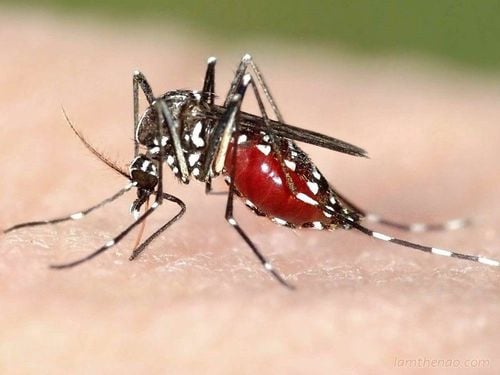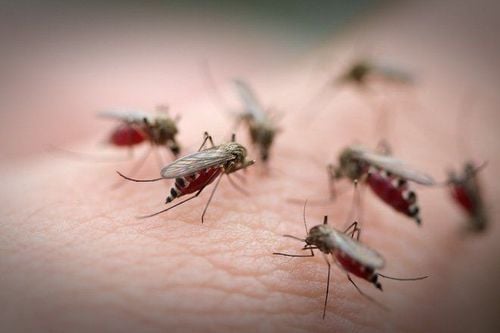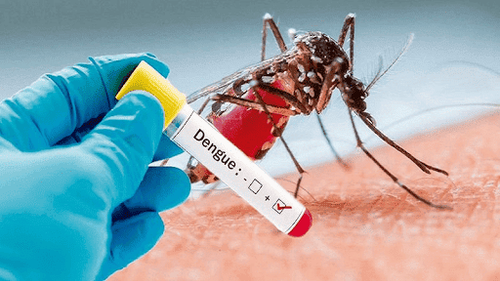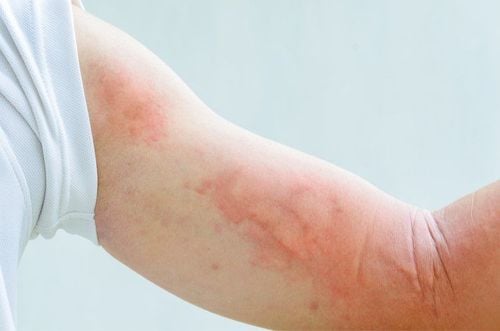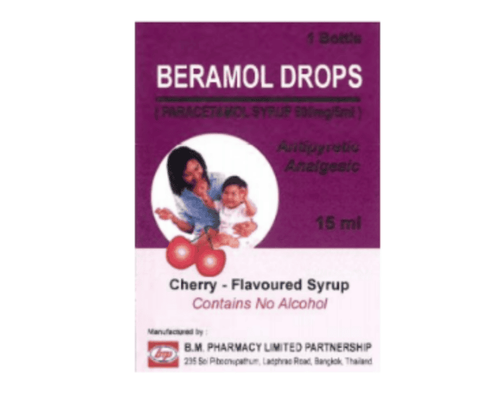This is an automatically translated article.
The article was professionally consulted by MSc, Dr. Trinh Thi Thanh Huyen - Obstetrician and Gynecologist - Department of Obstetrics and Gynecology - Vinmec Hai Phong International General HospitalDengue fever outbreaks are usually spread through mosquito bites. In many cases, the disease presents with mild flu-like symptoms, in others, there are symptoms and a complicated course such as fever, hemorrhage, and plasma leakage, which can lead to circulatory failure due to hypovolemia, dyspnoea. blood clots, and multi-organ failure.... If unfortunately, dengue fever during pregnancy can endanger the life of the mother and the fetus.
1. The stages of dengue fever
Dengue fever is a disease with rapid and diverse progression, divided into 3 stages:
Fever phase (mild level): Is the incubation period of dengue fever: The patient shows signs of sudden high fever. , continuity. Feeling of headache, loss of appetite, nausea, muscle and joint pain, pain in both eyes. Possible bleeding under the skin (congestive skin), bleeding gums, nosebleeds. Tired and exhausted body. Critical phase (Severe): Usually from day 3 to day 7 of illness. Patients may still have fever or reduce fever, may have the following manifestations: fatigue or lethargy, cold extremities, cold and moist skin, small rapid pulse, low blood pressure, little urine. Subcutaneous bleeding, mucosal bleeding (bleeding from the nose, gums; hematuria, abnormal vaginal bleeding). Subclinical: concentrated blood, decreased platelets, increased liver enzymes. In severe cases, there are signs of blood clotting disorders. Recovery phase: After 1-2 days of the critical phase, the patient's fever gradually disappeared, his general condition improved, his appetite, hemodynamic stability was stable, and he urinated a lot.

Ở giai đoạn phục hồi tâm trạng bệnh nhân sẽ dần tốt lên, thèm ăn
In addition to the above signs, pregnant women need to pay attention to other signs: low pregnancy rate, vaginal bleeding, intermittent abdominal pain and cramping, severe pain can be a symptom of fetal distress, placental abruption, premature birth, low birth weight babies. During labor, the baby can have acute fetal distress, when the mother has an indication for a cesarean section, there is a risk of severe life-threatening bleeding.
During labor, if the mother has dengue fever during pregnancy, the baby may have a fever within 1-2 weeks of age, making it difficult to treat. Babies born with the following signs need special attention: high fever of 40 degrees or lower or lower than 36 degrees, irritability, agitation or lethargy, rash, stop feeding...
2. Dengue fever during pregnancy is dangerous?
Dengue fever during pregnancy is recognized as a dangerous condition that needs to be monitored and treated promptly due to many reasons:
Pregnant women's bodies have weak resistance to disease, disease status may be more dangerous than others. Increased risk of preeclampsia. Increased risk of miscarriage, stillbirth in the first months of pregnancy. Increased risk of preterm birth. At the end of pregnancy and during labor, can cause heavy bleeding, postpartum hemorrhage has a risk of death for both mother and baby.
3. What to do when you have dengue fever during pregnancy?
Because there is no vaccine to prevent Dengue hemorrhagic fever for pregnant women and no specific treatment, we can only focus on treating symptoms.
When there are signs of disease or suspicion of infection, pregnant women need to go to the doctor for treatment indications. Specifically: It is necessary to visit reputable medical facilities to get an early diagnosis of the disease and provide treatment as soon as possible. Treatment also depends on the condition of each person, so do not arbitrarily buy drugs to use drugs during pregnancy. For mild cases, patients can recover on their own within a few days and can treat and monitor the disease at home. For moderate and severe cases, pregnant women must be treated in a hospital specializing in infectious diseases or the intensive care unit combined with obstetrics. If the fever is higher than 39 degrees, it is necessary to reduce fever with paracetamol 10-15mg/kg body weight (Paracetamol can be used for pregnant women), loosen clothes, apply cool compresses. If the fever is <39 degrees, there is no need to take medicine, just drink lots of water, milk, fruit juice and cool compresses, wear cool clothes. Patients should rest in bed, limit movement as much as possible. Regarding the diet, should eat liquid such as porridge, soup to help ease digestion and provide enough nutrients, reduce the feeling of loss of appetite.

Khi bị sốt xuất huyết thai phụ nên ăn đồ ăn lỏng cho dễ tiêu
Pregnant women need to keep a comfortable mood, avoid too much anxiety that affects the health of mother and baby, adhere to the treatment regimen and instructions of medical staff. If you're close to giving birth and you're sick, you should arrange to give birth at a large maternity hospital, a provincial hospital - where there are adequate facilities and human resources to deal with bad situations.
Note: If you have dengue fever during pregnancy, you and your family should not automatically give fluids without a doctor's prescription. Do not take other antipyretics other than paracetamol (if used, consult a doctor). During the treatment, it is necessary to monitor in the emergency department or the infectious department and have the expertise of an obstetrician. Dengue during labor is extremely dangerous, with the risk of postpartum haemorrhage and possibly death.
4. How to prevent dengue fever during pregnancy
To prevent the outbreak of dengue fever, the best way for everyone to proactively prevent disease during the rainy season is to clean the living environment, periodically spray insecticides to kill pathogens such as mosquitoes, larvae, ticks... Pregnant women should wear long-sleeved shirts, long pants, use anti-mosquito ointments to avoid being bitten, and sleep under a mosquito net even during the day. In the family, it is recommended to install a screen to cover doors and windows to prevent mosquitoes, regularly clear and clean the living environment. Avoid standing water in and around the house; jars, jars, bottles, with water left for a long time without lids... are all environments that create favorable conditions for mosquitoes to breed and cause disease. Pregnant women should also avoid vacationing in areas with many stagnant ponds or dense forests with many mosquitoes.
Dengue fever during pregnancy is very dangerous because there is a risk of affecting the fetus, if there is a lot of blood loss during labor, there is a risk of mother and baby death. Therefore, when there are any symptoms of dengue fever, pregnant women should go to a medical facility for examination, treatment and monitoring of the disease. Actively preventing mosquito bites is the most effective way to prevent dengue fever, pregnant women should actively prevent.
If you have a need for consultation and examination at Vinmec Hospitals under the nationwide health system, please book an appointment on the website for service.
Please dial HOTLINE for more information or register for an appointment HERE. Download MyVinmec app to make appointments faster and to manage your bookings easily.




